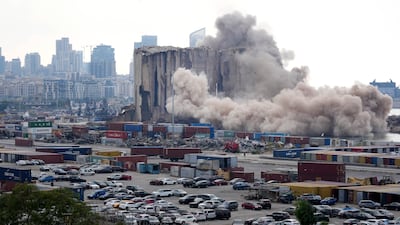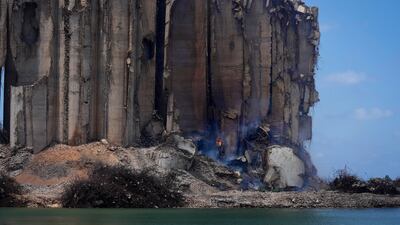Families of the victims of the August 2020 Beirut port blast have criticised the government’s response to the current fire at the port.
The blaze broke out more than a week ago in a grain silo, which was severely damaged in the explosion that rocked the Lebanese capital, killing at least 215 people and injuring more than 7,000.
The fire, which has brought back memories of the traumatic explosion that occurred nearly two years ago, has been blamed on the summer heat and fermenting wheat in the northern part of the silos.
Lebanon’s caretaker Minister of the Economy Amin Salam said the government is working hard to tackle the problem but conceded the situation was complicated. He said, for instance, that an operation using a military helicopter could cause the fire to spread due to a change in air pressure.
Authorities have banned anyone from going too close to the silos.
But campaign groups, families of the victims of the blast and others have lashed out at the government for not doing enough to stop the fire.
“In terms of the fire, the state hasn't done anything,” Cecile Roukoz — whose brother, Joseph, died in the 2020 explosion — told The National.
“Since they know what the fire is composed of, they can bring in a special powder to smother it.”
Mr Salam, who toured the port on Thursday, said the fires will continue as the wheat continues to ferment, but he added that removing the grains risked causing the silo to collapse.
But this view has been rejected by some.
“The fire must be put out and as long as there is fermentation it will continue. They should put it out and empty it,” Ms Roukoz said.
“The minister yesterday said if they emptied it maybe the silos would fall but the engineers are saying no this isn't correct. After all this, after the explosion and the south side of the silo is still standing, it's not believable for wheat grains to be the only thing keeping it up — there's a steel structure which is supporting the silos.”
The 2020 explosion occurred after a massive stock of ammonium nitrate, which had been sitting at the port for years, caught fire.
The silos remain a sensitive topic in Lebanon. The 2020 explosion has been blamed on mismanagement and corruption, and is viewed as a symptom of the country's many systemic problems.
In April, the Lebanese Cabinet approved the demolition of the silos after a survey found that they could collapse in the coming months.
But many, including some families of the victims, want the silos to remain as a memorial.
The silos are sometimes referred to as “silent witnesses”, because they “saw everything which the victims experienced just before they passed”, Ms Roukoz said.
“It's vital for us that the silos be a memorial for them.”
Families of the victims filed three separate lawsuits last month to stop the government from demolishing the silos.
Some victims' relatives have said they believe the fire was started intentionally to destroy the silos.
Asked about those claims on Thursday, Mr Salam cited experts' reports that it was the result of fermentation.
An investigation into the port explosion by judge Tarek Bitar has struggled to make headway amid repeated delays. Two sitting MPs in the Lebanese Parliament have been charged in connection with the investigation but have refused to attend interrogation hearings.
















































